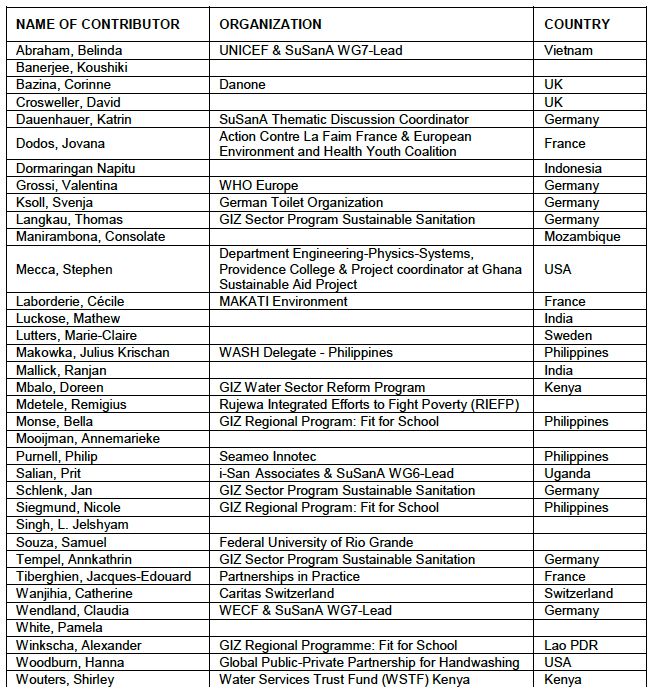- Health and hygiene, schools and other non-household settings
- Schools (sanitation and hygiene in schools)
- Various thematic discussions (time bound) - 3
- Managing WASH in Schools – Is the Education Sector ready? (Thematic Discussion 9)
- Theme 1: Policy Issues on the Regional and Global Level
- Theme 1: Policy Issues on the Regional and Global Level
Theme 1: Policy Issues on the Regional and Global Level
39.5k views
- Katrin
-
 Topic Author
Topic Author- I am coordinating SuSanA's thematic discussion series. Let me know if you have any questions!
Less- Posts: 71
- Karma: 8
- Likes received: 35
Re: TDS: Urban WASH in Schools - Is the education sector ready? - Synthesis
SYNTHESIS
Dear all,
The synthesis of our thematic discussion on urban WASH in schools is now available!
You can find the pdf-document in SuSanA's library: www.susana.org/en/resources/library/details/2677
Thank you for your interest and participation!
Kind regards,
Katrin
Dr. Katrin Dauenhauer
SuSanA Thematic Discussion Series Coordinator
Bonn, Germany
SuSanA Thematic Discussion Series Coordinator
Bonn, Germany
Attachments:
-
 ScreenShot...2.54.png
(Filesize: 209KB)
ScreenShot...2.54.png
(Filesize: 209KB)
Please Log in to join the conversation.
You need to login to reply- Katrin
-
 Topic Author
Topic Author- I am coordinating SuSanA's thematic discussion series. Let me know if you have any questions!
Less- Posts: 71
- Karma: 8
- Likes received: 35
Dear discussion participants,
We are happy to announce that the synthesis report of our discussion on urban WASH in schools is close to being published on SuSanA. Thank you again for your valuable inputs and the vivid discussion.
As you may know, we usually include a list of contributors, including information on their affiliation and country, at the end of the summaries of our thematic discussions.
As we are missing some of that information, we wanted to give you a chance to complete or correct your information. Therefore, we kindly ask you to contact Thomas Langkau (This email address is being protected from spambots. You need JavaScript enabled to view it.) to provide the missing details. We are happy to add this information to the report before publishing.
All requests for changes have to be provided by Wednesday, November 9, 9 am CST.
Please take a look at the following list:
Thank you so much,
Katrin
We are happy to announce that the synthesis report of our discussion on urban WASH in schools is close to being published on SuSanA. Thank you again for your valuable inputs and the vivid discussion.
As you may know, we usually include a list of contributors, including information on their affiliation and country, at the end of the summaries of our thematic discussions.
As we are missing some of that information, we wanted to give you a chance to complete or correct your information. Therefore, we kindly ask you to contact Thomas Langkau (This email address is being protected from spambots. You need JavaScript enabled to view it.) to provide the missing details. We are happy to add this information to the report before publishing.
All requests for changes have to be provided by Wednesday, November 9, 9 am CST.
Please take a look at the following list:
Thank you so much,
Katrin
Dr. Katrin Dauenhauer
SuSanA Thematic Discussion Series Coordinator
Bonn, Germany
SuSanA Thematic Discussion Series Coordinator
Bonn, Germany
Attachments:
-
 ScreenShot...0.14.png
(Filesize: 157KB)
ScreenShot...0.14.png
(Filesize: 157KB)
The following user(s) like this post: cecile
Please Log in to join the conversation.
You need to login to reply- Katrin
-
 Topic Author
Topic Author- I am coordinating SuSanA's thematic discussion series. Let me know if you have any questions!
Less- Posts: 71
- Karma: 8
- Likes received: 35
Dear discussion participants,
Thank you very much for your thoughtful contributions to our discussion on policy issues on the regional and global level with regard to WASH in Schools.
The official part of the discussion is hereby closed but you are of course welcome to continue to post in this thread.
We will provide a synthesis report of the discussion by the beginning of November and will I will inform you here how to access it once it is available.
Best,
Katrin
Thank you very much for your thoughtful contributions to our discussion on policy issues on the regional and global level with regard to WASH in Schools.
The official part of the discussion is hereby closed but you are of course welcome to continue to post in this thread.
We will provide a synthesis report of the discussion by the beginning of November and will I will inform you here how to access it once it is available.
Best,
Katrin
Dr. Katrin Dauenhauer
SuSanA Thematic Discussion Series Coordinator
Bonn, Germany
SuSanA Thematic Discussion Series Coordinator
Bonn, Germany
Please Log in to join the conversation.
You need to login to reply- BelindaA
-

- Belinda Abraham
Less- Posts: 16
- Karma: 2
- Likes received: 14
It's amazing that even in developed countries like Germany, the success of WASH in schools is still often reliant on individuals! This poses a challenge to institutionalise something like WASH in schools, when it is so reliant on individuals to make it work!
Belinda Abraham
Hanoi, Vietnam
+84 (0)1685580482
skype: Belinda.Abraham2
Recently joined as of May 2018, East Meets West (EMW)/ Thrive Network as Country Director/ Regional Program Director based in Viet Nam. New programming areas: WASH- PPP's, social enterprises, FSM and School WASH (WiNs) with a focus in South East Asia.
Career profile: WASH Specialist, over 15 years in Eastern and Southern Africa, South East Asia, primarily working for UNICEF.
Key areas of interest: WASH in Schools, WASH Communication and Community-based Sanitation and Hygiene Promotion
Hanoi, Vietnam
+84 (0)1685580482
skype: Belinda.Abraham2
Recently joined as of May 2018, East Meets West (EMW)/ Thrive Network as Country Director/ Regional Program Director based in Viet Nam. New programming areas: WASH- PPP's, social enterprises, FSM and School WASH (WiNs) with a focus in South East Asia.
Career profile: WASH Specialist, over 15 years in Eastern and Southern Africa, South East Asia, primarily working for UNICEF.
Key areas of interest: WASH in Schools, WASH Communication and Community-based Sanitation and Hygiene Promotion
The following user(s) like this post: cecile
Please Log in to join the conversation.
You need to login to reply- ValeGrossi
-
 Less
Less- Posts: 2
- Likes received: 1
Hello! 
I would like to share with you the results of the study on WASH in schools that I have conducted in Germany with the support of the Institute of Hygiene and Public Health, University Bonn. The study involved 5 schools, 172 pupils, 4 school directors and 3 experts from city health authority.
In Germany the city is responsible for availability and maintenance of the facilities in school, with the city education authority having most of the responsibility.
Facilities in schools were in place and functioning and maintenance was reported as efficient. Nevertheless, pupils don't have healthy behaviours: many avoid visiting the toilets, a consistent number do not always wash their hands with soap after using the toilet and/or do not drink enough water at school.
The study analysed possible issues behind these results. In particular at the institution level:
-The cleaning plan set by the authorities could be improved,as it cannot always ensure clean facilities, especially in the afternoon and after the breaks;
-Some hindering factors may limit maintenance efficiency, i.e. limited human resources (both in schools and authorities), high costs and fixed budgets, not always efficient coordination between the various stakeholders;
-More detailed regulations, like the ones for health-care facilities, could help the current efforts of improving WASH in schools, providing for example guidance on hygiene education (not yet standardised), adequate cleaning, and practical toilets-pupils ratios;
-Also, school principals have officially less accountability for WASH in schools, overtaken by care-takers, and do not always fulfil their duties, but successful examples reported by experts are usually initiated by engaged principals;
I would like to share with you the results of the study on WASH in schools that I have conducted in Germany with the support of the Institute of Hygiene and Public Health, University Bonn. The study involved 5 schools, 172 pupils, 4 school directors and 3 experts from city health authority.
In Germany the city is responsible for availability and maintenance of the facilities in school, with the city education authority having most of the responsibility.
Facilities in schools were in place and functioning and maintenance was reported as efficient. Nevertheless, pupils don't have healthy behaviours: many avoid visiting the toilets, a consistent number do not always wash their hands with soap after using the toilet and/or do not drink enough water at school.
The study analysed possible issues behind these results. In particular at the institution level:
-The cleaning plan set by the authorities could be improved,as it cannot always ensure clean facilities, especially in the afternoon and after the breaks;
-Some hindering factors may limit maintenance efficiency, i.e. limited human resources (both in schools and authorities), high costs and fixed budgets, not always efficient coordination between the various stakeholders;
-More detailed regulations, like the ones for health-care facilities, could help the current efforts of improving WASH in schools, providing for example guidance on hygiene education (not yet standardised), adequate cleaning, and practical toilets-pupils ratios;
-Also, school principals have officially less accountability for WASH in schools, overtaken by care-takers, and do not always fulfil their duties, but successful examples reported by experts are usually initiated by engaged principals;
The following user(s) like this post: cecile
Please Log in to join the conversation.
You need to login to reply- ThomasLangkau
-
Less
- Posts: 4
- Likes received: 3
Re: Theme 1: Policy Issues on the Regional and Global Level
Dear all,
We received a mail from Remigius Mdetele which we would like to share with you:
Its true that most of schools do not have enough education concerning the issues relating with WASH in schools. This problem is great to school committees in rural and urban and to persons living with HIV/AIDS or in live in areas with scarcity of water supply. The situation is worse in rural areas where there is low exposure to modern technologies and training.
The main cause of this problems, include lack of collective planning, lack of knowledge to prioritize on funds from the government and other stakeholders. In some cases, the rural leadership is not aware of the importance of minimizing open defecation.
In this context, we would like to work with you in areas relating WASH programmes.
Remigius Mdetele
Executive Director
Rujewa Integrated Efforts to Fight Poverty (RIEFP)
P.O.Box 189, Rujewa-Mbeya
Tanzania.
We received a mail from Remigius Mdetele which we would like to share with you:
Its true that most of schools do not have enough education concerning the issues relating with WASH in schools. This problem is great to school committees in rural and urban and to persons living with HIV/AIDS or in live in areas with scarcity of water supply. The situation is worse in rural areas where there is low exposure to modern technologies and training.
The main cause of this problems, include lack of collective planning, lack of knowledge to prioritize on funds from the government and other stakeholders. In some cases, the rural leadership is not aware of the importance of minimizing open defecation.
In this context, we would like to work with you in areas relating WASH programmes.
Remigius Mdetele
Executive Director
Rujewa Integrated Efforts to Fight Poverty (RIEFP)
P.O.Box 189, Rujewa-Mbeya
Tanzania.
The following user(s) like this post: cecile
Please Log in to join the conversation.
You need to login to reply
If I may make a small comment at this late stage.
We have but 70 school ecosans, mainly in Tamil Nadu, and these cover circa 30,000 pupils about 65% being girls. We provide a before and after training programme. There is no doubt from our experience that where the head teacher and staff engage with the pupils regarding the facilities there is better usage and greater hygiene knowledge. This impacts greatly on the messages the children take back to their families.
Sorry I couldn't join in when the discussion was taking place.
We have but 70 school ecosans, mainly in Tamil Nadu, and these cover circa 30,000 pupils about 65% being girls. We provide a before and after training programme. There is no doubt from our experience that where the head teacher and staff engage with the pupils regarding the facilities there is better usage and greater hygiene knowledge. This impacts greatly on the messages the children take back to their families.
Sorry I couldn't join in when the discussion was taking place.
The following user(s) like this post: cecile
Please Log in to join the conversation.
You need to login to replyRe: Theme 1: Policy Issues on the Regional and Global Level
Dear Cecile and Philip,
indeed, here in Lao PDR we have just recently started cooperation with both the World Food Program and PLAN International (funded through WFP) to combine the FIT approach with their school feeding programs. Based on research into their intervention outcomes, WFP identified that there should be a stronger emphasis on Hygiene in order to improve results on nutrition indicators as well. What we are now piloting is really no rocket science - but a simple combination of approaches: daily group handwshing before eating the provided school lunch, and daily group toothbrushing after eating lunch. Sounds simple and straightforward, yet rarely happens, at least here.
The simplicity of this combination is in line with one of our Fit for School 4S principles: too keep it simple. That way it won´t overburden school principals and teachers, at the same time through the design of the intervention (focusing on group acitivity and using facilities adequate for group use) ensuring that the logistical challenges are adressed and make the hygiene component manageable for a school. Even if you manage a relatively small school with under 100 students, you will have to wait for a long time until every student washed their hands if there is just one bucket of water (let alone the question of running vs. standing water) or just a collection of 3 water taps.
Furthermore, since we strongly believe in daily practice to foster behavior change, linking up handwashing and toothbrushing as daily group acitivities explicitly with the daily ritual of eating lunch will hopefully also encourage students to make these links when it comes to eating food beyond the school lunch setting.
Best, Alex
indeed, here in Lao PDR we have just recently started cooperation with both the World Food Program and PLAN International (funded through WFP) to combine the FIT approach with their school feeding programs. Based on research into their intervention outcomes, WFP identified that there should be a stronger emphasis on Hygiene in order to improve results on nutrition indicators as well. What we are now piloting is really no rocket science - but a simple combination of approaches: daily group handwshing before eating the provided school lunch, and daily group toothbrushing after eating lunch. Sounds simple and straightforward, yet rarely happens, at least here.
The simplicity of this combination is in line with one of our Fit for School 4S principles: too keep it simple. That way it won´t overburden school principals and teachers, at the same time through the design of the intervention (focusing on group acitivity and using facilities adequate for group use) ensuring that the logistical challenges are adressed and make the hygiene component manageable for a school. Even if you manage a relatively small school with under 100 students, you will have to wait for a long time until every student washed their hands if there is just one bucket of water (let alone the question of running vs. standing water) or just a collection of 3 water taps.
Furthermore, since we strongly believe in daily practice to foster behavior change, linking up handwashing and toothbrushing as daily group acitivities explicitly with the daily ritual of eating lunch will hopefully also encourage students to make these links when it comes to eating food beyond the school lunch setting.
Best, Alex
The following user(s) like this post: cecile
Please Log in to join the conversation.
You need to login to reply- ThomasLangkau
-
Less
- Posts: 4
- Likes received: 3
Re: Theme 1: Policy Issues on the Regional and Global Level
Dear all,
I would like to share L.Jelshyam Singh`s contribution with you, we received in a mail:
What we observed on WASH in schools are
1. there has not been a proper directives or policy in school education.
2. there is lack of responsibility of the school authorities in such management.
3. observed that the present political situation encourages lack of common interest and teachers are more on individualism in nature.
4. a separate mission / flagship program on WinS is urgently required .
I hope we can do something change the mindset of the people through dialogue and development involving women in planning and management.
with regards
L.Jelshyam Singh
I would like to share L.Jelshyam Singh`s contribution with you, we received in a mail:
What we observed on WASH in schools are
1. there has not been a proper directives or policy in school education.
2. there is lack of responsibility of the school authorities in such management.
3. observed that the present political situation encourages lack of common interest and teachers are more on individualism in nature.
4. a separate mission / flagship program on WinS is urgently required .
I hope we can do something change the mindset of the people through dialogue and development involving women in planning and management.
with regards
L.Jelshyam Singh
Please Log in to join the conversation.
You need to login to reply
Dear all,
Many thanks Katrin and Vielen Danke Susana for this much needed opportunity to share our reflections on these important issues.
I find it very stimulating to read the introduction of this discussion and the emphasis it puts on the need for leadership in relation to WinS. For sure, we are not merely talking about top down leadership from the Ministry of Education, but also about the kind of pervasive leadership needed amongst school, community and district level stakeholders for WinS to work. The introduction also refers to the promise of inter-sectoral collaboration in relation to SDGs with clear implications on WinS. Let us also consider the growing trend in development agencies to better integrate WASH-health, and food security, and notably in schools. How to better manage WinS? That is a big issue too, and it only takes a few visits to schools in areas of intervention of WinS programmes to realise how challenging it is to anchor new hygiene habits and to set up sustainable WinS O&M systems.
So this thematic discussion really addresses the big issues in relation to WinS. Where shall I start? Well, I would like to tell you about WaterAid recent WinS research - In view of its long-running concern about the state of WinS, and against the background of its extensive programmatic and policy work on the topic, WaterAid took the initiative in 2015 to undertake a programme of research. I joined the research team led by Richard Carter and was tasked to undertake four country case studies in south Asia (Bangladesh, India, Nepal and Pakistan). There were also several case studies in East Africa.
Much of the work consisted in reviewing and deepening existing WinS bottleneck analyses, or in the case of countries with no such analysis, undertaking them. In the four Asian countries, the research not only provided us with an opportunity to undertake comprehensive bottleneck analyses, but it allowed us to dig a bit deeper and explore the underlying causes of strengths and weaknesses. A wide range of political economy factors, often well-known by practitioners but unfortunately rarely factored in programmes, have thus been uncovered and analysed. The case study reports deliver interesting insights into WinS dynamics at central, district and local levels. Good practices from various organisations are also extracted and recommendations made to improve WinS programming.
Indeed, we cannot reasonably go on implementing business-as-usual approaches when we know deep inside the gap between the impact of most WinS programmes and the rosy pictures of WinS brochures. WinS programmes gives great pictures, which are real sources of inspiration for many of us. WinS also deliver the big numbers of beneficiaries that donors often look for. All great. But in the real world WinS is tough work and not many organisations can take pride in achieving decent levels of sustainability. My personal view is that collectively, we need a deeper, shared understanding of the problem. Many issues and obstacles are known but not made explicit. New strategies are needed, which address the underlying hindering factors and activate the potential for change.
Sharing the findings of our research - At this stage the case study reports are not yet in the public domain, and I think it is just a matter of weeks now. That being said, given the relevance of our findings to this thematic discussion, I am allowed to share here the executive summaries of the four reports. Hopefully they can help fuel exchanges. I am attaching the files to this post and I shall post a link to the full reports as soon as they are in the public domain.
Best wishes,
Jacques
Many thanks Katrin and Vielen Danke Susana for this much needed opportunity to share our reflections on these important issues.
I find it very stimulating to read the introduction of this discussion and the emphasis it puts on the need for leadership in relation to WinS. For sure, we are not merely talking about top down leadership from the Ministry of Education, but also about the kind of pervasive leadership needed amongst school, community and district level stakeholders for WinS to work. The introduction also refers to the promise of inter-sectoral collaboration in relation to SDGs with clear implications on WinS. Let us also consider the growing trend in development agencies to better integrate WASH-health, and food security, and notably in schools. How to better manage WinS? That is a big issue too, and it only takes a few visits to schools in areas of intervention of WinS programmes to realise how challenging it is to anchor new hygiene habits and to set up sustainable WinS O&M systems.
So this thematic discussion really addresses the big issues in relation to WinS. Where shall I start? Well, I would like to tell you about WaterAid recent WinS research - In view of its long-running concern about the state of WinS, and against the background of its extensive programmatic and policy work on the topic, WaterAid took the initiative in 2015 to undertake a programme of research. I joined the research team led by Richard Carter and was tasked to undertake four country case studies in south Asia (Bangladesh, India, Nepal and Pakistan). There were also several case studies in East Africa.
Much of the work consisted in reviewing and deepening existing WinS bottleneck analyses, or in the case of countries with no such analysis, undertaking them. In the four Asian countries, the research not only provided us with an opportunity to undertake comprehensive bottleneck analyses, but it allowed us to dig a bit deeper and explore the underlying causes of strengths and weaknesses. A wide range of political economy factors, often well-known by practitioners but unfortunately rarely factored in programmes, have thus been uncovered and analysed. The case study reports deliver interesting insights into WinS dynamics at central, district and local levels. Good practices from various organisations are also extracted and recommendations made to improve WinS programming.
Indeed, we cannot reasonably go on implementing business-as-usual approaches when we know deep inside the gap between the impact of most WinS programmes and the rosy pictures of WinS brochures. WinS programmes gives great pictures, which are real sources of inspiration for many of us. WinS also deliver the big numbers of beneficiaries that donors often look for. All great. But in the real world WinS is tough work and not many organisations can take pride in achieving decent levels of sustainability. My personal view is that collectively, we need a deeper, shared understanding of the problem. Many issues and obstacles are known but not made explicit. New strategies are needed, which address the underlying hindering factors and activate the potential for change.
Sharing the findings of our research - At this stage the case study reports are not yet in the public domain, and I think it is just a matter of weeks now. That being said, given the relevance of our findings to this thematic discussion, I am allowed to share here the executive summaries of the four reports. Hopefully they can help fuel exchanges. I am attaching the files to this post and I shall post a link to the full reports as soon as they are in the public domain.
Best wishes,
Jacques
This attachment is hidden for guests.
Please log in or register to see it.
Please log in or register to see it.
This attachment is hidden for guests.
Please log in or register to see it.
Please log in or register to see it.
This attachment is hidden for guests.
Please log in or register to see it.
Please log in or register to see it.
This attachment is hidden for guests.
Please log in or register to see it.
Please log in or register to see it.
Jacques-Edouard Tiberghien, MSc. PhD.
Expert sénior // Senior Expert
Email: This email address is being protected from spambots. You need JavaScript enabled to view it.
Tel: + 33 (0)4 90 22 57 80 - Skype: jacques-edouard
198 Chemin d’Avignon 84470 Châteauneuf-de-Gadagne, France
Expert sénior // Senior Expert
Email: This email address is being protected from spambots. You need JavaScript enabled to view it.
Tel: + 33 (0)4 90 22 57 80 - Skype: jacques-edouard
198 Chemin d’Avignon 84470 Châteauneuf-de-Gadagne, France
This message has attachments files.
Please log in or register to see it.
The following user(s) like this post: cecile
Please Log in to join the conversation.
You need to login to reply- CONSOLATE
-
 Less
Less- Posts: 2
- Likes received: 1
Dear Katrin,
Thank you for the summary.
Just some comments:
- There is no lack of cooperation but there is a need of enhancing cooperation at high level
- I believe that teachers have some knowledge and capacity. There is a need of building their knowledge and capacity.
Thank you
Consolate
Thank you for the summary.
Just some comments:
- There is no lack of cooperation but there is a need of enhancing cooperation at high level
- I believe that teachers have some knowledge and capacity. There is a need of building their knowledge and capacity.
Thank you
Consolate
Consolate Manirambona
e-mail: This email address is being protected from spambots. You need JavaScript enabled to view it.
Tel: +258 27122126
Cell: 258820519120
Mozambique
e-mail: This email address is being protected from spambots. You need JavaScript enabled to view it.
Tel: +258 27122126
Cell: 258820519120
Mozambique
The following user(s) like this post: cecile
Please Log in to join the conversation.
You need to login to reply- PhilipPurnell
-
 Less
Less- Posts: 4
- Likes received: 12
Re: Theme 1: Policy Issues on the Regional and Global Level
I agree that nutrition has a crucial impact on student learning outcomes having particular high impact on brain development in early child development. Globally, both health and education research points to the critical link between adequate nutrition/malnutrition and child learning. This is why many Ministries of Education in Southeast Asia prioritize school feeding programs for the early grades of primary school. One of the biggest challenges faced by such school-feeding program is that they are very expensive and logistically difficult to mount on a large-scale. Targeted school feeding programs are more affordable and manageable but these raise equity issues if only certain children are beneficiaries. Logistical management of food stuffs, cooking and distribution can be taxing for schools particularly those with limited resources. Wastage/food spoilage and food sanitation/contamination are also challenges.
One approach being explored by the FIT program was maximizing school gardens using local indigenous vegetable crops but this approach may not be suitable for large urban schools. The goal of was to develop low cost affordable and easy to prepare menus using locally available fruit and vegetables - partnering with parents and school communities for food preparation and distribution. Research was also being undertaken on low cost/low maintenance cooking technologies. Still early days yet, and unfortunately GIZ has decided not to give a major focus on the nutrition component of FIT due concerns re: sustainability issues. Government-led and financed initiatives, however are continuing. In Laos the national FIT team has recently signed an agreement with the World Food Program to encourage hand washing at critical times before meals.
The Philippines has been using Conditional Cash transfer programs targeting malnourished communities for some years with good results in terms of positive impact on student learning outcomes, participation/retention and cohort survival rates. The new Philippine government is now contemplating adding a daily rice allocation to the conditional cash transfer program. But again questions are being raised about logistics management in operationalizing such a program across the 40,000 primary schools in the country.
Note: SBM stands for school-based management where the school head in partnership with the local community, is empowered to make decisions re: contextualization of the curriculum, school improvement planning, resource mobilization and school-level capacity programs for teachers.
One approach being explored by the FIT program was maximizing school gardens using local indigenous vegetable crops but this approach may not be suitable for large urban schools. The goal of was to develop low cost affordable and easy to prepare menus using locally available fruit and vegetables - partnering with parents and school communities for food preparation and distribution. Research was also being undertaken on low cost/low maintenance cooking technologies. Still early days yet, and unfortunately GIZ has decided not to give a major focus on the nutrition component of FIT due concerns re: sustainability issues. Government-led and financed initiatives, however are continuing. In Laos the national FIT team has recently signed an agreement with the World Food Program to encourage hand washing at critical times before meals.
The Philippines has been using Conditional Cash transfer programs targeting malnourished communities for some years with good results in terms of positive impact on student learning outcomes, participation/retention and cohort survival rates. The new Philippine government is now contemplating adding a daily rice allocation to the conditional cash transfer program. But again questions are being raised about logistics management in operationalizing such a program across the 40,000 primary schools in the country.
Note: SBM stands for school-based management where the school head in partnership with the local community, is empowered to make decisions re: contextualization of the curriculum, school improvement planning, resource mobilization and school-level capacity programs for teachers.
The following user(s) like this post: CONSOLATE, cecile
Please Log in to join the conversation.
You need to login to reply
Share this thread:
- Health and hygiene, schools and other non-household settings
- Schools (sanitation and hygiene in schools)
- Various thematic discussions (time bound) - 3
- Managing WASH in Schools – Is the Education Sector ready? (Thematic Discussion 9)
- Theme 1: Policy Issues on the Regional and Global Level
- Theme 1: Policy Issues on the Regional and Global Level
Recently active users. Who else has been active?
Time to create page: 0.162 seconds







